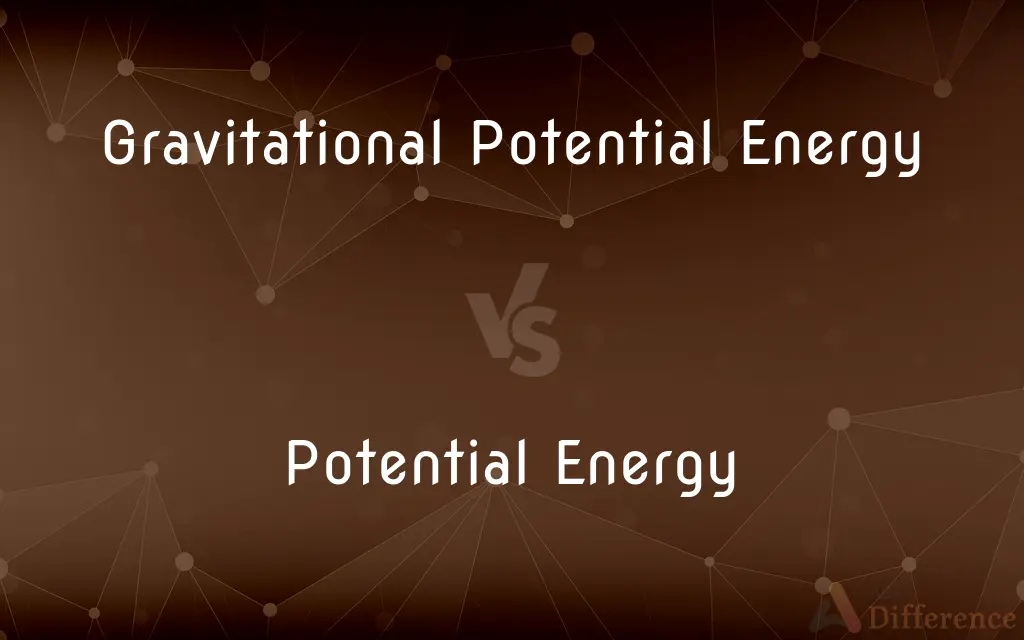Gravitational Potential Energy vs. Potential Energy — What's the Difference?
By Tayyaba Rehman — Published on January 5, 2024
Gravitational potential energy is the energy an object possesses due to its position in a gravitational field, while potential energy is a broader term encompassing energy stored due to an object's position or state.

Difference Between Gravitational Potential Energy and Potential Energy
Table of Contents
ADVERTISEMENT
Key Differences
Gravitational potential energy is a form of potential energy specifically related to an object's height and mass in a gravitational field. Potential energy, more broadly, includes any stored energy due to an object's position, arrangement, or state.
The formula for gravitational potential energy is U=mgh, where m is mass, g is the acceleration due to gravity, and h is height.
Potential energy, in general, can vary in form, including elastic potential energy, chemical potential energy, and others.
Gravitational potential energy increases with height and is a key concept in fields like astrophysics and engineering. Potential energy encompasses other forms like energy stored in a stretched spring or compressed gas.
The concept of gravitational potential energy is central to understanding phenomena such as orbital mechanics and free fall. Potential energy is a fundamental concept in various branches of physics, including mechanics, thermodynamics, and quantum mechanics.
ADVERTISEMENT
In practical terms, gravitational potential energy is harnessed in hydroelectric power plants. Potential energy, in its various forms, is exploited in numerous applications, from the potential energy in fuels to the energy stored in batteries.
Comparison Chart
Definition
Energy due to position in a gravitational field
Energy stored due to position or state
Formula
U=mgh
Varies based on type
Key Influencing Factors
Mass, height, gravity
Position, arrangement, internal state
Primary Applications
Hydroelectric power, orbital mechanics
Diverse, including mechanics, thermodynamics
Examples
Water in a reservoir, a suspended object
Stretched spring, chemical bonds
Compare with Definitions
Gravitational Potential Energy
The potential energy related to an object's mass and gravity.
The higher the object, the greater its gravitational potential energy.
Potential Energy
Stored energy due to an object's position or state.
A drawn bow has potential energy.
Gravitational Potential Energy
Energy of an object due to its height in a gravitational field.
A rock on a cliff has gravitational potential energy.
Potential Energy
Energy in an object not currently in motion.
A battery stores electrical potential energy.
Gravitational Potential Energy
Energy stored when an object is raised against gravity.
A hoisted weight possesses gravitational potential energy.
Potential Energy
Energy related to position in a force field.
Chemical potential energy is stored in fuel.
Gravitational Potential Energy
Convertible to kinetic energy upon falling.
When an apple falls, its gravitational potential energy converts to kinetic energy.
Potential Energy
Stored energy that can be released as kinetic energy.
Compressed springs have potential energy.
Gravitational Potential Energy
Energy that depends on height above the ground.
Gravitational potential energy increases as a drone ascends.
Potential Energy
The energy possessed by an object's arrangement.
The potential energy in a rock at a hilltop can cause it to roll down when disturbed.
Common Curiosities
Can potential energy be converted to other forms?
Yes, it can be converted to kinetic energy and other forms.
What is gravitational potential energy?
Energy an object possesses due to its position in a gravitational field.
How is gravitational potential energy calculated?
Using the formula U=mgh.
What encompasses potential energy?
It includes any energy stored due to an object's position, arrangement, or state.
Is gravitational potential energy always due to height?
Yes, it specifically relates to an object's height in a gravitational field.
Does potential energy include gravitational energy?
Yes, gravitational potential energy is a type of potential energy.
What are examples of potential energy?
Elastic potential energy in springs, chemical energy in fuels.
What's a practical use of gravitational potential energy?
In hydroelectric power, where water's height is converted to electricity.
What factors affect gravitational potential energy?
The object's mass, height, and the strength of the gravitational field.
What happens to gravitational potential energy when an object falls?
It is converted into kinetic energy.
Can potential energy be zero?
Yes, when there's no stored energy based on position or state.
Does the type of potential energy depend on the force involved?
Yes, different forces result in different types of potential energy (e.g., gravitational, elastic).
How does potential energy play a role in everyday life?
It's present in stretched or compressed objects, fuels, batteries, etc.
Can potential energy be found in a vacuum?
Yes, as long as there's a position or state that stores energy.
Is gravitational potential energy relevant in space?
Yes, especially in understanding orbits and celestial mechanics.
Share Your Discovery

Previous Comparison
Top-down Approach vs. Bottom-up Approach
Next Comparison
Solution vs. SolventAuthor Spotlight
Written by
Tayyaba RehmanTayyaba Rehman is a distinguished writer, currently serving as a primary contributor to askdifference.com. As a researcher in semantics and etymology, Tayyaba's passion for the complexity of languages and their distinctions has found a perfect home on the platform. Tayyaba delves into the intricacies of language, distinguishing between commonly confused words and phrases, thereby providing clarity for readers worldwide.













































